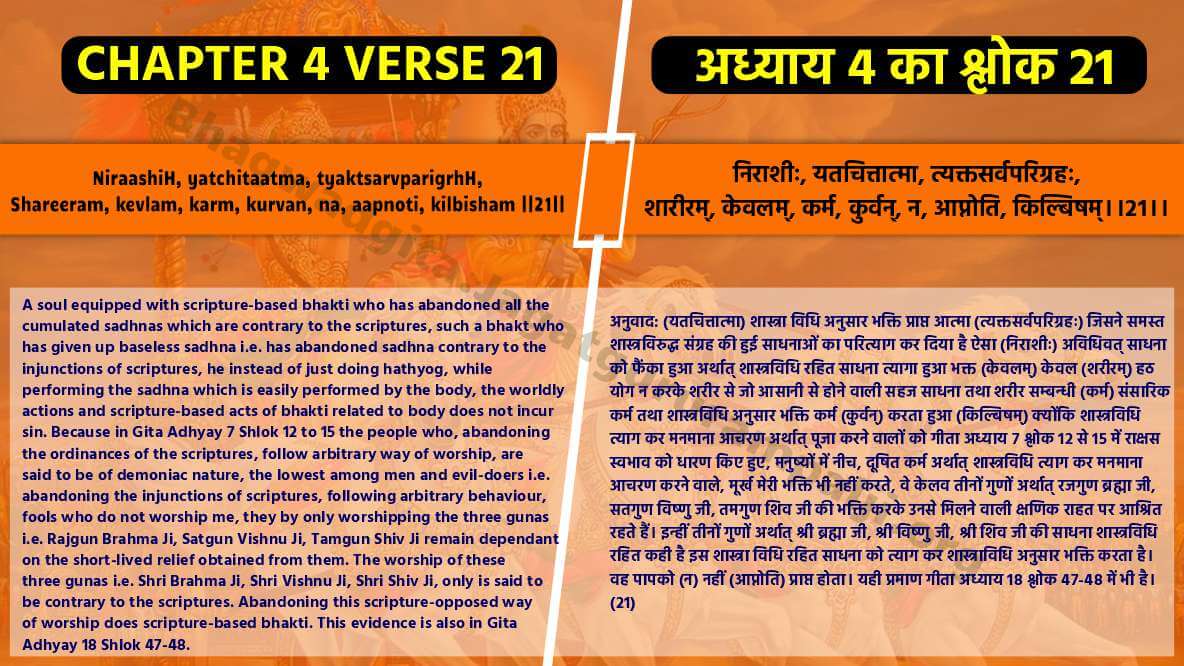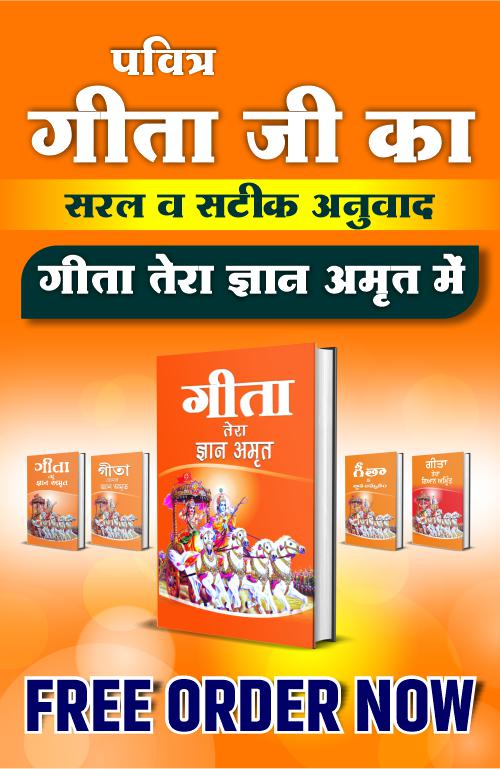
NiraashiH, yatchitaatma, tyaktsarvparigrhH,
Shareeram, kevlam, karm, kurvan, na, aapnoti, kilbisham ||21||
Translation: (Yatchitaatma) a soul equipped with scripture-based bhakti (tyaktsarvparigrhH) who has abandoned all the cumulated sadhnas which are contrary to the scriptures, such a (niraashiH) bhakt who has given up baseless sadhna i.e. has abandoned sadhna contrary to the injunctions of scriptures (kevlam) just/only (shareeram) instead of doing hathyog, the sadhna easily performed by the body, and related to body (karm) worldly actions and scripture-based acts of bhakti (kurvan) while performing (kilbisham) sin; because in Gita Adhyay 7 Shlok 12 to 15 the people who, abandoning the ordinances of the scriptures, follow arbitrary way of worship, are said to be of demoniac nature, the lowest among men, evil-doers i.e. abandoning the injunctions of scriptures, following arbitrary behaviour, fools who do not worship me, they by only worshipping the three gunas i.e. Rajgun Brahma, Satgun Vishnu, Tamgun Shiv Ji remain dependant on the short-lived relief obtained from them. The worship of these three gunas i.e. Shri Brahma Ji, Shri Vishnu Ji, Shri Shiv Ji, only is said to be contrary to the scriptures. Abandoning this scripture-opposed way of worship does scripture-based bhakti. (na) not (aapnoti) incur. (21)
Translation
A soul equipped with scripture-based bhakti who has abandoned all the cumulated sadhnas which are contrary to the scriptures, such a bhakt who has given up baseless sadhna i.e. has abandoned sadhna contrary to the injunctions of scriptures, he instead of just doing hathyog, while performing the sadhna which is easily performed by the body, the worldly actions and scripture-based acts of bhakti related to body does not incur sin. Because in Gita Adhyay 7 Shlok 12 to 15 the people who, abandoning the ordinances of the scriptures, follow arbitrary way of worship, are said to be of demoniac nature, the lowest among men and evil-doers i.e. abandoning the injunctions of scriptures, following arbitrary behaviour, fools who do not worship me, they by only worshipping the three gunas i.e. Rajgun Brahma Ji, Satgun Vishnu Ji, Tamgun Shiv Ji remain dependant on the short-lived relief obtained from them. The worship of these three gunas i.e. Shri Brahma Ji, Shri Vishnu Ji, Shri Shiv Ji, only is said to be contrary to the scriptures. Abandoning this scripture-opposed way of worship does scripture-based bhakti. This evidence is also in Gita Adhyay 18 Shlok 47-48.
निराशीः, यतचित्तात्मा, त्यक्तसर्वपरिग्रहः,
शारीरम्, केवलम्, कर्म, कुर्वन्, न, आप्नोति, किल्बिषम्।।21।।
अनुवाद: (यतचित्तात्मा) शास्त्रा विधि अनुसार भक्ति प्राप्त आत्मा (त्यक्तसर्वपरिग्रहः) जिसने समस्त शास्त्रा विरुद्ध संग्रह की हुई साधनाओं का परित्याग कर दिया है ऐसा (निराशीः) अविधिवत् साधना को फैंका हुआ अर्थात् शास्त्रा विधि रहित साधना त्यागा हुआ भक्त (केवलम्) केवल (शरीरम्) हठ योग न करके शरीर से जो आसानी से होने वाली सहज साधना तथा शरीर सम्बन्धी (कर्म) संसारिक कर्म तथा शास्त्रा विधि अनुसार भक्ति कर्म (कुर्वन्) करता हुआ (किल्बिषम्) क्योंकि शास्त्र विधि त्याग कर मनमाना आचरण अर्थात् पूजा करने वालों को गीता अध्याय 7 श्लोक 12 से 15 में राक्षस स्वभाव को धारण किए हुए, मनुष्यों में नीच, दूषित कर्म अर्थात् शास्त्रा विधि त्याग कर मनमाना आचरण करने वाले, मूर्ख मेरी भक्ति भी नहीं करते, वे केलव तीनों गुणों अर्थात् रजगुण ब्रह्मा जी, सतगुण विष्णु जी, तमगुण शिव जी की भक्ति करके उनसे मिलने वाली क्षणिक राहत पर आश्रित रहते हैं। इन्हीं तीनों गुणों अर्थात् श्री ब्रह्मा जी, श्री विष्णु जी, श्री शिव जी की साधना शास्त्रा विधि रहित कही है इस शास्त्रा विधि रहित साधना को त्याग कर शास्त्राविधि अनुसार भक्ति करता है। वह पापको (न) नहीं (आप्नोति) प्राप्त होता। यही प्रमाण गीता अध्याय 18 श्लोक 47-48 में भी है। (21)
